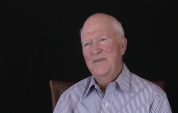12:32 | Bill Pearson had been to Vietnam twice and returned unscathed, but the Army wasn't done putting him in danger. He was assigned as an aviation consultant to Iran, advising the Shah's air force on it's supply of American aircraft. The day he arrived, martial law was declared and it wasn't long before there were mobs outside trying to burn down the building. The embassy was no help. Escape seemed impossible.
Keywords : Bill Pearson Western Kentucky University Reserve Officer Training Corps (ROTC) Pershing Rifles Command and General Staff College (CGSC) Iran Mohammad Reza Pahlavi Shah advisor Isfahan martial law Iranian embassy Revolutionary Guard roadblocks whiskey hostages political asylum

Anyone who's in the Army for an extended period can point to mentors who helped them or inspired them along the way. Bill Pearson remembers several, including Norman Schwarzkopf.
He wanted to fly. Three times Bill Pearson applied to the Air Force Academy and three times he was first alternate. He finally said to heck with it and finished college with ROTC and took an Army commission. He also joined the local Army Reserve unit. At Fort Benning, he was hardened with the infantry officer's basic course, Ranger school and jump school.
The 199th Light Infantry Brigade was forming up at Fort Benning to deploy to Vietnam. Bill Pearson was with them as a platoon leader. They went to Vietnam as a unit, which was not the norm. Once there, they spent weeks just acclimating and their first combat experience was against the local wildlife.
After a month guarding an ammo dump, the men of Bill Pearson's platoon were anxious to see some action. Their first real assignment was in the delta south of Saigon and it wasn't long before those same men missed the boredom of that guard duty.
After the war, Bill Pearson served as a JROTC instructor and he always got the question, "Did you ever kill anybody?" He would then relate a story about a dead Viet Cong, who had a letter from his fiance in his pocket.
Bill Pearson was walking along the top of a flooded rice paddy dike when the man in front of him stepped on a booby trap. The explosion wounded that man and the man behind him, but he was untouched. When his radioman was hit, he had to carry the litter through the deep muck.
Bill Pearson's platoon was on call as part of a rapid reaction force. Their base of operations was in the delta south of Saigon. They did not get into any hairy situations from that arrangement but they did have some dangerous moments jumping into the water from hovering choppers during their own operations.
Platoon leader Bill Pearson sent out a squad to set up a night ambush and when they made contact, it was with a much larger VC force. With the rest of the platoon, he set out to find them and bring them back. When he located the besieged squad, the battle became intense and they were in danger of being wiped out. In a desperation move, he called in artillery on his own position.
Near the end of his first tour in Vietnam, Bill Pearson was appointed Executive Officer of the unit. As XO, one of the things he had to manage was the daily helicopter flights to men in the field to deliver rations and supplies. On one of these trips, he had to make a decision about an overloaded aircraft that still haunts him.
After his first tour of Vietnam, Bill Pearson was assigned to a training unit which was preparing soldiers for deployment there. He was ready to return to private life and had submitted the paperwork when he got a call. How can we convince you to stay? Well, I always wanted to go to flight school.
He had been an infantry officer during his first tour, but now Bill Pearson was back as a Cobra gunship pilot. He literally climbed into a Cobra the moment he arrived and was immediately in a huge firefight. Thankfully, this pace did not continue.